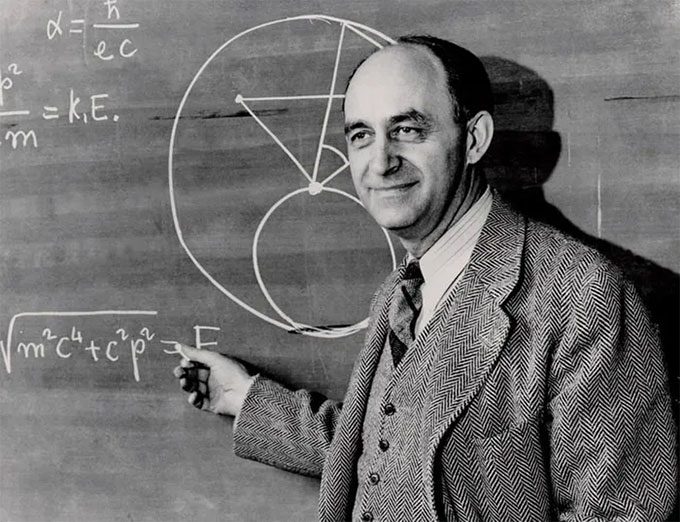The vast universe contains hundreds of billions of galaxies, each filled with stars and planets.
The Milky Way alone is home to over 100 billion planets, most of which lie within the “habitable zone” with the potential for life. While discussing this topic, scientist Enrico Fermi posed the paradox: Why is there no evidence for the existence of entities out there?

Physicist Enrico Fermi.
Is There Life Beyond Earth?
The issue of extraterrestrial life raised by Enrico Fermi is known as the “Fermi Paradox,” which has sparked extensive debate. With varying perspectives on the potential nature of extraterrestrial civilizations, scientists strive to explain the absence of aliens in our section of the universe.
First, the “Rare Earth Hypothesis” suggests that while microbial life may be relatively common in the universe, complex life forms are extremely rare. Factors such as a planet’s specific orbital characteristics, geological activity, and protective magnetic fields may be less common than we think, making Earth exceptionally rare.
Next is the “Great Filter” theory, which acknowledges that all forms of life face an almost insurmountable barrier at some point in their development, preventing them from progressing to a stage capable of communication or interstellar travel.
An even more mystical idea is the “Zoo Hypothesis”. This suggests that advanced civilizations are aware of Earth but have collectively decided not to make contact, instead observing us from a distance, much like we observe animals in a zoo.
This theory posits that interstellar civilizations agree to allow younger species to evolve naturally, without outside interference.
Following this is the hypothesis that civilizations may only exist fleetingly on a cosmic timescale. The so-called “Transient Civilizations” emerge and fade away in such a short span of time that they cannot act together or invade the stars. This ephemerality of advanced civilizations means that the window for two intelligent species to communicate is incredibly narrow.
In addition to these mainstream hypotheses, some lesser-known ideas also attempt to explain the “Fermi Paradox.” Notably, there is the possibility of a post-biological universe, where advanced beings have transitioned from biological forms to digital existence, reducing their need or desire to explore the material universe.
Moreover, civilizations may be too sparsely distributed across vast distances, or their signals and artifacts may be undetectable by our current technology and understanding.
Thus, the paradox remains, and although it is challenging to find answers, it tells us one thing: Unless we are the sole intelligent life in this galaxy—a highly unlikely scenario given what we know—something is preventing civilizations from reaching the stars.

Are humans alone in the universe?
The Search Continues
Despite the lack of evidence for extraterrestrial signs, efforts to find Earth’s neighbors have not diminished. To date, the Search for Extraterrestrial Intelligence (SETI) continues to employ powerful telescopes that continuously scan the stars for signals that might indicate the presence of intelligent life.
Future missions, both on the ground and in space, aimed at exploring exoplanets in greater detail and studying their atmospheres for signs of life, are ongoing. Technological advancements may allow us to detect biological signs or technological signatures, providing compelling evidence of extraterrestrial life.
As planned, in October 2024, the Europa Clipper spacecraft from NASA will be launched to Europa, one of Jupiter’s moons. With its unique terrain combining an icy crust and a molten core that allows for a hidden layer of liquid water beneath, a vast subsurface ocean enveloping the planet, Europa is considered the most promising candidate for extraterrestrial life, which the Clipper is actively searching for.
So far, the “Fermi Paradox” remains one of the most intriguing questions in our quest to understand our place in the universe. Although no answers have yet been found, the search continues to inspire both scientific research and philosophical debate.
Whether we are alone in the universe or part of a vast network of civilizations, the pursuit of knowledge and exploration of the unknown continues to drive humanity forward.
In the future, as we look deeper into the universe, we may find that we are indeed not alone. But until that day comes, the silent universe remains a great mystery, continually igniting human curiosity.
| Enrico Fermi (1901 – 1954) was a renowned Italian physicist. Along with Robert Oppenheimer, he is regarded as one of the “fathers of the atomic bomb”, and he holds several patents related to nuclear energy. He was awarded the Nobel Prize in Physics in 1938 for his theory of induced radioactivity and the discovery of transuranic elements. The global physics community recognizes Fermi as one of the very few scientists proficient in both theory and experiment. |




















































